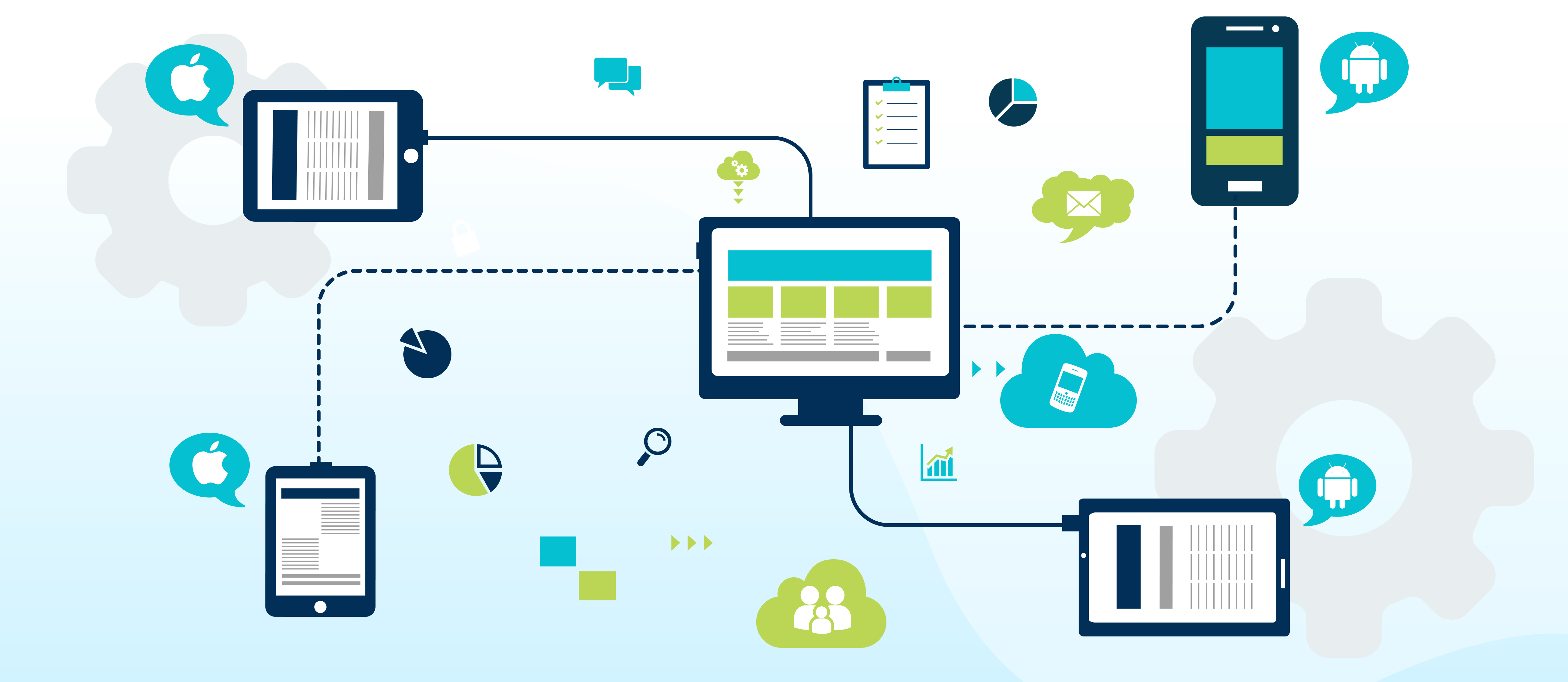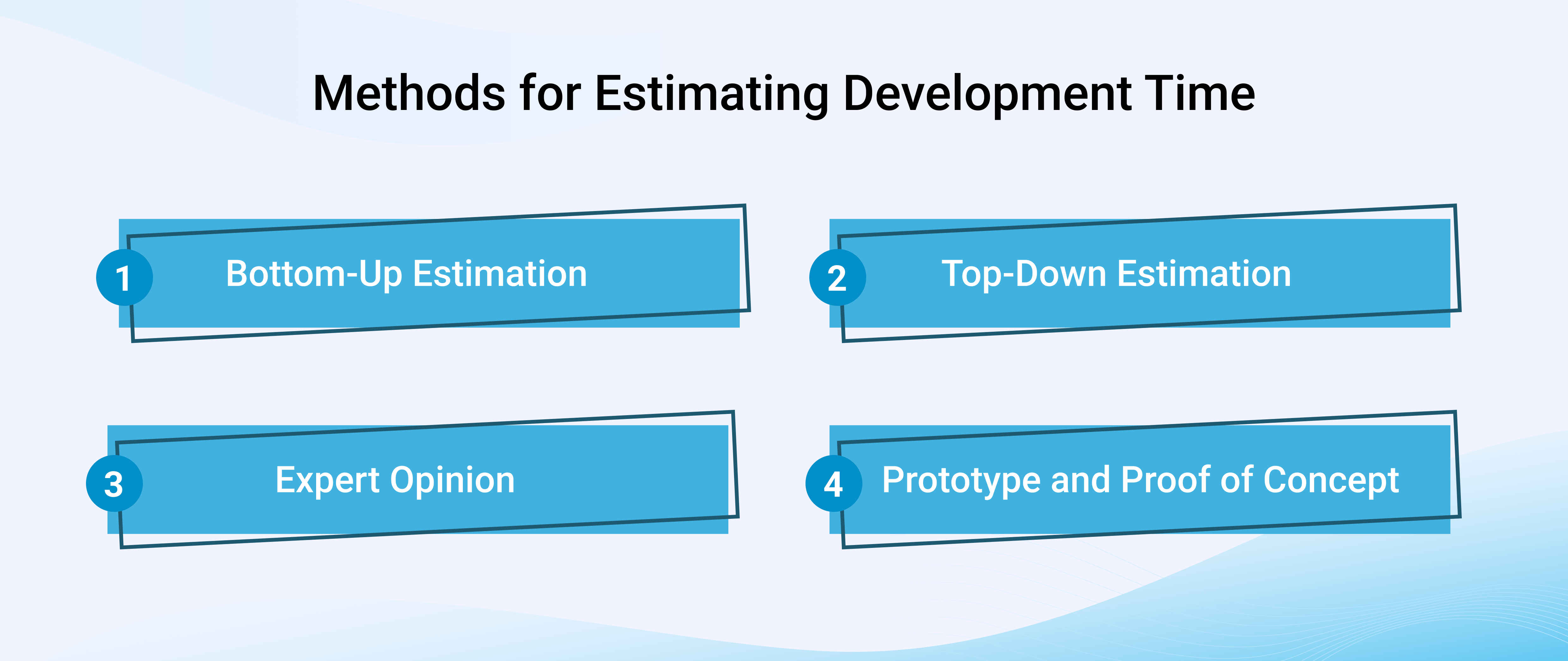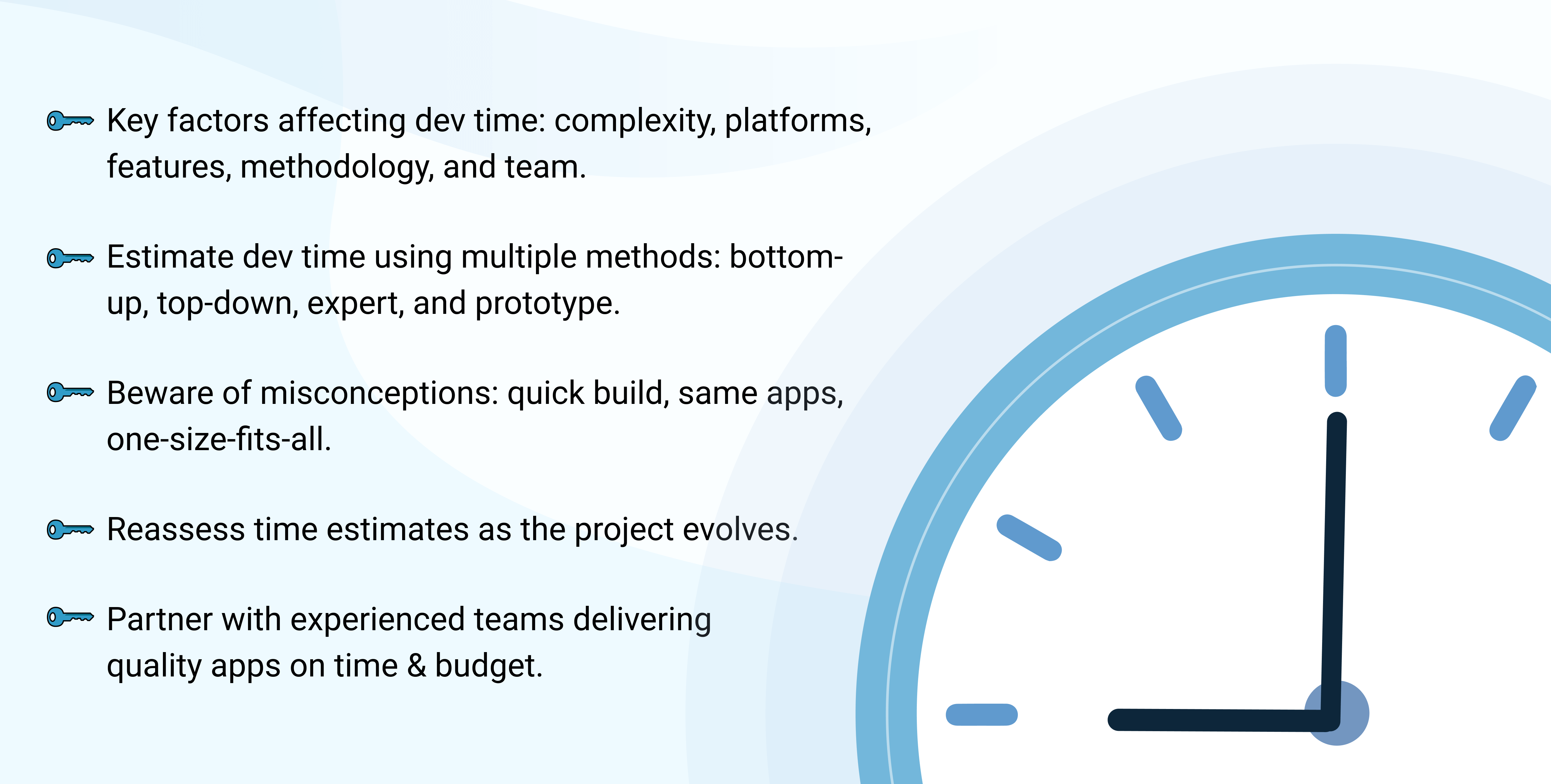
Posted by: Cloudus Infotech Pvt. Ltd.
Table Of Contents
1. Introduction
2. Factors That Impact Development Time
- 2.1 App Complexity
- 2.2 Number of Platforms and Devices
- 2.3 Features and Functionality
- 2.4 Development Methodology
- 2.5 Team Size and Experience
3. Methods For Estimating Development Time
- 3.1 Bottom-Up Estimation
- 3.2 Top-Down Estimation
- 3.3 Expert Opinion
- 3.4 Prototype and Proof of Concept
4. Common Misconceptions About Development Time
- 4.1. "Apps Can Be Built Quickly”
- 4.2 "All Apps Are the Same”
- 4.3 "One-Size-Fits-All Solutions Exist"
5. Conclusion
Developing a mobile app can be a complex and time-consuming process. The timeline for mobile app development can vary significantly depending on several factors, such as the complexity of the app, the size of the development team, the level of customization required, and the amount of testing needed.
Typically, the process involves planning, designing, development, and testing phases. During the planning phase, the development team will work with you to identify your project goals, determine your target audience, and map out the overall architecture of the app. Once the planning phase is complete, the team will move on to the design phase, where a detailed mockup of the app's user interface is created.
With the design phase complete, the development team will move on to building the app. This is where the actual coding and development takes place, and it's a stage that can take a significant amount of time, from a few months to over a year, depending on the complexity of the app and the number of features involved.
Once the development phase is complete, the app undergoes rigorous testing to ensure it is functioning correctly and free from bugs or glitches. The testing phase can be a time-consuming process, particularly if the app requires extensive testing to ensure compatibility with different devices or operating systems.
Overall, it's important to work closely with your development team to create a detailed plan and timeline for your project. By understanding the timeline involved and being prepared for unexpected delays or changes that can impact the overall timeline, you can ensure a successful project that delivers the results you're looking for.
Introduction
1. Definition of Mobile App Development:
Mobile app development refers to creating software applications that run on mobile devices, such as smartphones and tablets. With the increasing popularity and use of mobile devices, the demand for mobile apps has grown significantly. Mobile app development can range from simple, single-function apps to complex, multi-feature apps that require significant resources and development time.
2. Importance of Accurate Time Estimation:
Accurate time estimation is crucial in mobile app development for several reasons. First, it helps in the planning and budgeting of a project. By having a realistic idea of how long the development process will take, project managers can allocate the necessary resources and budget accordingly. Second, it helps in setting expectations with clients and stakeholders. If a project timeline is set too short, it can result in unrealistic expectations and possible disappointment. On the other hand, if the timeline is set too long, it can result in delays and additional costs.
Factors That Impact Development Time
1. App Complexity:
The complexity of an app is one of the primary factors that affect development time. A simple app with limited features and functionality can be developed relatively quickly, while a complex app with multiple features and integrations can take significantly longer. Complexity can also impact the development process, as it can increase the number of bugs and technical issues that need to be addressed during the testing phase.
2. Number of Platforms and Devices:
The number of platforms and devices the app needs to support can also affect development time. Developing an app for multiple platforms, such as iOS and Android, will take longer than developing for just one platform. Additionally, the app must be tested and optimized for different devices and screen sizes, which can add additional time to the development process.

3. Features and Functionality:
The features and functionality of an app can also have a significant impact on development time. Adding new features and functionalities can increase the complexity of the app, which can in turn, increase the development time. For example, incorporating a payment gateway or integrating with a third-party API can add additional time to the development process.
4. Development Methodology:
The development methodology can also affect development time. Some methodologies, such as Agile, allow for more flexible and iterative development, while others, such as Waterfall, require a more structured and sequential approach. The methodology chosen will impact the development timeline and should be considered when estimating the overall development time.

5. Team Size and Experience:
The size of the development team and their experience can also impact development time. A larger team with more experience may be able to work more efficiently and complete the project more quickly. On the other hand, a smaller team with less experience may take longer to complete the project.
Methods for Estimating Development Time

1. Bottom-Up Estimation:
Bottom-up estimation is a method of calculating the total development time by breaking down the project into smaller tasks and estimating the time for each one. This approach is often considered the most accurate as it provides a detailed breakdown of the development process, including all necessary steps, dependencies, and resources. However, it can also be time-consuming and may require significant resources, including a project manager and multiple developers.
2. Top-Down Estimation:
Top-down estimation is a high-level approach that starts with a rough estimate of the overall project timeline and is then refined as more information becomes available. This method is often used when the project scope is not well defined or when there is limited information about the project requirements. While this method is quicker and requires fewer resources than bottom-up estimation, it can be less accurate and may not provide a detailed understanding of the project timeline.
3. Expert Opinion:
Expert opinion involves getting input from experienced professionals in the field, including project managers, developers, and consultants. This method is useful when there is limited information available about the project and its requirements. However, expert opinions can vary greatly, and the accuracy of this method depends on the expertise of the individuals involved.
4. Prototype and Proof of Concept:
Prototype and proof of concept development can help provide a better understanding of the project timeline. This method involves developing a working version of the app with only a critical feature as MVP, which can then be used to estimate the development time for the full version. This approach is often used to validate the app idea and determine the feasibility of the project. However, it can also be time-consuming and may not provide a complete understanding of the project timeline.
Common Misconceptions About Development Time
1. "Apps Can Be Built Quickly"
Many people believe that mobile apps can be developed quickly, with a common misconception being that an app can be built in just a few weeks. However, this is not always the case, and the actual development time can vary greatly depending on the complexity of the app, the number of platforms and devices it needs to support, and the features and functionality it requires.
2. "All Apps Are the Same"
Some people believe that all apps are the same and that development time should not vary greatly between projects. However, this is not accurate, and development time can vary greatly depending on the complexity of the app and the features and functionality it requires.
3. "One-Size-Fits-All Solutions Exist"
Some people believe that there is a one-size-fits-all solution to mobile app development, but this is not accurate. Development time and cost can vary greatly depending on the complexity of the app, the number of platforms and devices it needs to support, and the features and functionality it requires.
Conclusion
1. The Importance of Accurate Time Estimation:
Accurately estimating the development time for a mobile app is important for several reasons, including the ability to budget for the project, plan resources, and to set expectations with stakeholders. A lack of accurate time estimation can lead to project delays, budget overruns, and frustrated stakeholders.
2. Key Takeaways for Accurately Estimating Mobile App Development Time:

